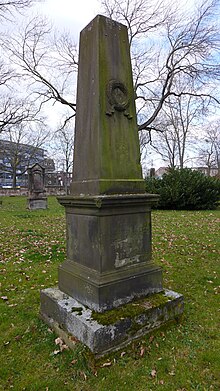Friedrich Wilhelm Unger
Friedrich Wilhelm Unger (born April 8, 1810 in Hanover , † December 22, 1876 in Göttingen ) was a German lawyer and art historian .
Life
Friedrich Wilhelm Unger was the son of the consistorial secretary Friedrich Rudolf Bodo Unger (1777–1821) and his wife Luise Frederike Henrietta Unger nee. Worms (1779 – after 1821). When he was 11 years old, his father died on May 11, 1821. His mother transferred the guardianship to Johann Andreas Wehner , and later also for his younger brother Julius Bodo Unger . In 1827 Unger moved to the Gotha grammar school for two years . In 1829 he began his law studies at the University of Göttingen . He interrupted this for two years to visit the art academy in Munich. In 1832 he returned to Göttingen, where he completed his studies in 1834 with the promotion of Dr. jur. from. In 1834 he entered the civil service as an official auditor in Hanover, on May 16, 1835 he married Ernestine Wurm, in 1837 he became an official assessor. In 1838 he moved to Göttingen, where he qualified as a professor at the law faculty in 1840. He became a member of the juridical verdict college in Göttingen. Since 1842 he has been working at the Göttingen University Library , where he was employed as library secretary in 1845. There he arranged u. a. the "Collecio Libellorum" collected in 1848 from the National Assembly in the Paulskirche in Frankfurt .
Since 1849 he devoted himself to art history, from 1857 he taught it at the university, in 1858 he was habilitated for it, and in spring 1863 he was appointed associate professor for art and art history and director of the academic gallery in addition to his library position . One of his main interests was early Christian and Byzantine art .
He died in Göttingen and was buried in the Bartholomäusfriedhof . His striking tombstone, which is still preserved there today, bears the inscription: "The memory of the righteous remains in the blessing".
His son William Unger became an engraver and etcher.
Fonts (selection)
- Roman and national law. A description of the position of Roman law in the modern state and especially of the struggle between national and Roman law in the kingdom of Castile . Goettingen 1848.
- Göttingen and Georgia Augusta , Göttingen 1861.
- Sources of Byzantine art history , extracted and translated by Friedrich Wilhelm Unger. Volume 1 (= sources on the history of art in the Middle Ages, Vol. 12). Braunmüller, Vienna 1878.
literature
- Eduard Chmelarz : Friedrich Wilhelm Unger . In: Friedrich Wilhelm Unger Sources of Byzantine Art History . Braunmüller, Vienna 1878, pp. VII – VIII.
- Ferdinand Frensdorff: Unger, Friedrich Wilhelm . In: Allgemeine Deutsche Biographie (ADB). Volume 39, Duncker & Humblot, Leipzig 1895, pp. 289-291.
- Martin Dennert: Friedrich Wilhelm Unger. In: Stefan Heid, Martin Dennert (Hrsg.): Personal Lexicon for Christian Archeology. Researchers and personalities from the 16th to the 21st century . Volume 2: K - Z. Schnell & Steiner, Regensburg 2012, ISBN 978-3-7954-2620-0 , p. 1258.
Web links
- Literature by and about Friedrich Wilhelm Unger in the catalog of the German National Library
Individual evidence
| personal data | |
|---|---|
| SURNAME | Unger, Friedrich Wilhelm |
| BRIEF DESCRIPTION | German lawyer and art historian |
| DATE OF BIRTH | April 8, 1810 |
| PLACE OF BIRTH | Hanover |
| DATE OF DEATH | December 22, 1876 |
| Place of death | Goettingen |
